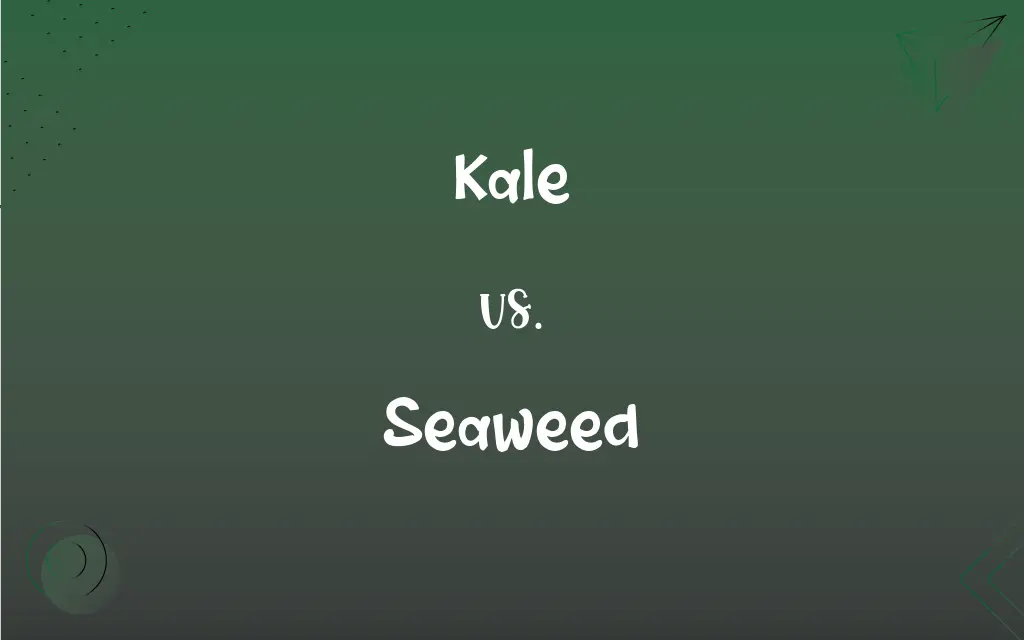Kale vs. Seaweed: What's the Difference?
Edited by Aimie Carlson || By Janet White || Updated on March 4, 2024
Kale is a nutrient-rich leafy green vegetable, high in vitamins A, C, and K, while seaweed is an umbrella term for marine algae, offering unique nutrients like iodine and omega-3 fatty acids.

Key Differences
Kale, a cruciferous vegetable, is known for its dense nutrient content, including high levels of vitamins, minerals, fiber, and antioxidants. It's a versatile ingredient in salads, smoothies, and cooked dishes, celebrated for its health benefits, such as supporting heart health and providing anti-inflammatory properties. On the other hand, seaweed encompasses a variety of edible marine plants and algae, each with distinct flavors and nutritional profiles. Seaweed is a staple in many Asian cuisines, used in soups, salads, and sushi, and is valued for its high content of iodine, essential for thyroid function, as well as its unique antioxidants and plant compounds.
While kale is primarily consumed fresh or lightly cooked to preserve its nutrient content, seaweed can be found in various forms, including dried, powdered, or fresh, expanding its use beyond traditional dishes to supplements and snacks. Kale's taste is earthy and slightly bitter, which can be mellowed through cooking or massaging the leaves, whereas seaweed offers a range of flavors from salty and briny to sweet, depending on the type.
Nutritionally, kale is an excellent source of vitamin K, which plays a vital role in blood clotting and bone health, while seaweed stands out for its iodine content, crucial for thyroid health. Additionally, seaweed contains unique bioactive compounds like fucoxanthin, which has been studied for its potential anti-obesity and anti-inflammatory effects.
Both kale and seaweed contribute to a healthy diet but serve different nutritional purposes. Incorporating both into meals can complement and enhance dietary diversity, offering a broad spectrum of vitamins, minerals, and health benefits. The choice between kale and seaweed may depend on individual health goals, dietary preferences, and culinary traditions.
Kale and Seaweed Definitions
Kale
Supports heart health and reduces inflammation.
Regular consumption of kale can contribute to cardiovascular health.
ADVERTISEMENT
Seaweed
Contains unique bioactive compounds.
Seaweed's fucoxanthin content has been researched for its health benefits.
Kale
A nutrient-dense leafy green vegetable.
Kale chips are a tasty, healthy snack option.
Seaweed
Offers a range of flavors from salty to sweet.
Nori has a unique, umami-rich flavor ideal for sushi rolls.
Kale
Rich in vitamins and antioxidants.
Adding kale to your smoothie boosts its nutritional value.
Seaweed
An umbrella term for edible marine plants and algae.
Seaweed salad is a popular appetizer in Japanese cuisine.
ADVERTISEMENT
Kale
Versatile in cooking.
Sautéed kale makes a great side dish for dinner.
Seaweed
High in iodine and omega-3 fatty acids.
Incorporating seaweed into your diet can support thyroid function.
Kale
Earthy and slightly bitter taste.
Massaging kale with a bit of olive oil softens its texture and reduces bitterness.
Seaweed
Any of numerous marine algae, such as a kelp, rockweed, or gulfweed.
Kale
A plant (Brassica oleracea var. acephala) in the mustard family, having dark green, spreading, usually crinkled leaves that are eaten as a vegetable. Also called borecole, cole, colewort.
Seaweed
A mass of such algae.
Kale
An edible plant, similar to cabbage, with curled leaves that do not form a dense head (Brassica oleracea var. acephala)
Seaweed
Any of numerous marine plants and algae, such as a kelp.
Kale
Any of several cabbage-like food plants that are kinds of Brassica oleracea.
Seaweed
(by extension) Any of various fresh water plants and algae.
Kale
(cooking) Broth containing kale as a chief ingredient.
Seaweed
Popularly, any plant or plants growing in the sea.
Kale
A variety of cabbage in which the leaves do not form a head, being nearly the original or wild form of the species.
Seaweed
Any marine plant of the class Algæ, as kelp, dulse, Fucus, Ulva, etc.
Kale
Informal terms for money
Seaweed
Plant growing in the sea, especially marine algae
Kale
A hardy cabbage with coarse curly leaves that do not form a head
Seaweed
Used in a variety of dishes and as supplements.
Dried seaweed is a crunchy, nutritious snack.
Kale
Coarse curly-leafed cabbage
FAQs
Can I substitute kale for seaweed in recipes?
While you can use them interchangeably in some dishes, they offer different flavors and nutrients, so the substitution may alter the taste and nutritional outcome.
How do I incorporate kale into my diet?
Kale can be added to salads, smoothies, soups, and can be sautéed or baked as chips.
What is kale?
Kale is a nutrient-rich leafy green vegetable, known for its high content of vitamins, minerals, and antioxidants.
Is kale or seaweed better for thyroid health?
Seaweed, due to its high iodine content, is particularly beneficial for thyroid health.
How does seaweed contribute to environmental health?
Seaweed cultivation can improve water quality by absorbing nutrients and carbon dioxide, offering an eco-friendly food source.
Can I grow kale and seaweed at home?
Kale can be easily grown in gardens or containers, while seaweed typically requires specific aquatic conditions not suitable for most home environments.
What is seaweed?
Seaweed refers to various edible marine plants and algae, each with unique nutritional profiles and culinary uses.
What are the health benefits of eating seaweed?
Seaweed supports thyroid function, provides anti-inflammatory and anti-obesity benefits, and contributes essential nutrients not commonly found in terrestrial plants.
Is it safe to eat seaweed every day?
Eating seaweed in moderation is generally safe, but excessive consumption, especially of varieties high in iodine, should be avoided to prevent potential thyroid issues.
Can kale help with weight loss?
Kale can be a beneficial part of a weight loss diet due to its low calorie and high fiber content, which can help in feeling fuller for longer.
How should I store kale and seaweed?
Kale should be stored in a refrigerator, preferably in a moisture-proof container, while dried seaweed should be kept in a cool, dry place.
How does the nutritional content of kale compare to seaweed?
Kale is high in vitamins A, C, and K, and minerals like calcium and iron, while seaweed is a unique source of iodine, omega-3 fatty acids, and marine antioxidants.
How do I prepare dried seaweed?
Dried seaweed often needs to be rehydrated in water before being added to dishes like soups and salads.
What are the most popular types of seaweed?
Popular types include nori (used in sushi), wakame (common in soups and salads), and kelp (used in various dishes and as supplements).
Is seaweed a good source of protein?
Seaweed contains protein, but its content varies among types. It can contribute to protein intake, especially in vegetarian and vegan diets.
What are the best ways to eat seaweed for health benefits?
Incorporating a variety of seaweeds into your diet through dishes like salads, soups, and snacks can maximize health benefits due to their diverse nutrient profiles.
How does the texture of kale and seaweed differ in dishes?
Kale typically adds a crunchy or chewy texture depending on its preparation, while seaweed can range from crispy in dried forms to soft and slippery when rehydrated or fresh.
Why does kale taste bitter?
Kale's bitterness is due to compounds called glucosinolates, which also contribute to its health benefits.
Are there any risks associated with consuming too much kale or seaweed?
Consuming large amounts of kale can interfere with thyroid function due to its goitrogens, and excessive seaweed intake can lead to iodine overload.
Can both kale and seaweed be used in vegan diets?
Yes, both kale and seaweed are plant-based and can be excellent additions to vegan diets, offering a range of essential nutrients.
About Author
Written by
Janet WhiteJanet White has been an esteemed writer and blogger for Difference Wiki. Holding a Master's degree in Science and Medical Journalism from the prestigious Boston University, she has consistently demonstrated her expertise and passion for her field. When she's not immersed in her work, Janet relishes her time exercising, delving into a good book, and cherishing moments with friends and family.
Edited by
Aimie CarlsonAimie Carlson, holding a master's degree in English literature, is a fervent English language enthusiast. She lends her writing talents to Difference Wiki, a prominent website that specializes in comparisons, offering readers insightful analyses that both captivate and inform.































































